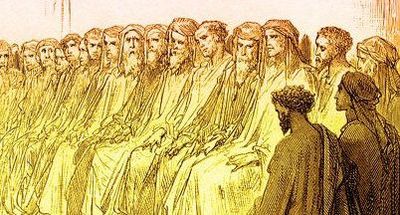In the city of Athens in ancient Greece a town crier walked in the streets proclaiming the call to gather as the Ekklesia. All were called out of their homes, from their business, their activities, their games and recreation, etc. It was a higher call to a spiritual gathering that began with prayer and sacrifices. It was a call to the highest form of society within Greek culture. Only those who answered the call and who gathered together were considered to be citizens of the Ekklesia. They discussed the entire direction of the city, they declared war, they made peace, they arranged foreign alliances, organized activities, elected generals to lead their armies, they commissioned armies to go forth into war, they decided how to use and distribute funds, and much more.
To answer the call, to enter the Ekklesia, and to be a citizen of the local Ekklesia demanded participation which was an absolute free choice. No one had to be a member of the Ekklesia but all heard the call and invitation to be a part of it. One had to be a fully functioning and committed member before being granted rights within it. Everybody contributed, all were willingly ruled, and all were valued as equal members. But if someone was not faithful in attendance or committed to the gatherings of the Ekklesia they lost their rights and benefits within the local Ekklesia. This term was known and understood right across the Greek and Roman world of the first century, and it was even used within Israel and Jerusalem.
Christ and the Apostles took this word, sanctified it, and used it for the regular, committed, faithful gathering of believers or disciples who had been called out of the world. The Ekklesia is the same believers gathering together, in the same place, at the same time, to do the same things. Those who say “you don't need to go to church” or “I have church at home” or “I am the church I don't need to go to church”, are ignoramuses (ignorant, or without knowledge of the biblical teaching)!
- The Same Believers Gathering Together – The Church of course is people not a building. But the Church is not individuals. It is utterly impossible to live out the teachings of Christ and the Apostles unless you do it in the context of regular fellowship and in solid relationship with other believers. I Cor.11:18, “... when ye come together in the church...”, 14:23, “...the whole church be come together...” Two or three Christians gathering together is not the Church. Its only a part of the Church at best. It is impossible to fulfil the teachings in the New Testament as an isolated individual. To be the church we must gather together regularly with the same believers. This is the Church. You can of course be a Christian by yourself but you cannot be the Church. So many in our day remain uncommitted to a regular gathering of the same called-out ones and as a result they utterly miss out on the blessing of it. They are also disobeying the scriptures by doing this (Heb.10:25).
- In the Same Place – The early church in Acts and in the Epistles always gathered together in the one same place as others. This defined the gathering of the church. You cannot stay at home alone and say you are having Church. Only when you physically gather in a certain set place can you call it church. The church is people but it is a gathered people. It may be in a home, a building, or even in the open-air, but it is always the same group of people gathering together in a previously organised and planned place. I Cor.11:20, “When ye come together therefore into one place...”, 14:23, “into one place”, Acts 2:1, “all with one accord in one place.”
- At the Same Time – Believers gather together as the church in the same place at the same time. This is how the church functions and operates. In the NT regular meetings were not just spontaneous. Most were at prearranged times and places. Even in revival the church in Acts had regular set hours and times to come together. This does not deny or hinder spontaneous leading's of the Spirit. Rather, such guidance takes place when such regular times are already in place. Acts 2:1, “And when the day of Pentecost was fully come”, 3:1, “Now Peter and John went up together into the temple at the hour of prayer, being the ninth hour.”
- To do the Same Things – In Acts 3, they gathered together to pray. Throughout the scriptures believers gathered together regularly to listen attentively to preaching and teaching. Other gatherings mentioned in the NT are elders meetings, church discipline gatherings, worship and singing, testimony meetings, etc. In I Cor. chapters 11 to 14, the word "together" is used eight times in referring to the gathering of believers as the church (Ekklesia), to break bread (communion), to be used in the manifestation of the gifts of the Spirit, where doctrine was taught, and a psalm or revelation given. The operation of the gifts and partaking of communion is for the gathering of the entire church in the same place at the same time - not for private individual gatherings at home or on a street corner.

 RSS Feed
RSS Feed